The Ethical Compass for Robots: Defining Morality in an Age of Automation
As we stand on the brink of a technological revolution, robots are no longer just figments of our imagination; they are becoming integral parts of our everyday lives. From self-driving cars that navigate busy streets to AI-powered assistants managing our schedules, automation is reshaping how we live and interact. But with these advancements come pressing questions about morality and ethics. Who decides what’s right or wrong for machines? As their influence grows, so does the need for an ethical compass for robots—a set of guidelines to ensure they operate in ways that align with human values. With every new leap in technology, it’s crucial to consider not just what robots can do, but also how they should act within society.

Understanding Morality in Humans and Machines
Morality is a complex concept deeply rooted in human experience. It’s shaped by emotions, culture, and social interactions. Humans often rely on empathy to make moral decisions, weighing the consequences of actions on others.
Machines, however, operate under different principles. They process data and follow programmed algorithms without feelings or subjective experiences. The challenge lies in translating human morals into something machines can understand.
To create an ethical compass for robots, we must identify universal values that can guide their decision-making processes. This involves not just logic but also consideration of emotional intelligence—something inherently human.
As we delve deeper into automation, redefining morality becomes essential. We need clear frameworks that allow robots to navigate ethical dilemmas while mirroring our core values as closely as possible. Balancing technical capabilities with moral obligations will be crucial in this evolving landscape.
Ethical Issues in Automation: From Self-Driving Cars to AI-Powered Assistants
The rise of automation brings with it a tapestry of ethical dilemmas. Self-driving cars, for instance, face the daunting task of making split-second moral decisions. When confronted with potential accidents, how should these vehicles weigh lives?
AI-powered assistants also introduce complexities. They can inadvertently perpetuate biases found in their training data. This raises questions about fairness and accountability.
Moreover, who is responsible when an AI makes a mistake? Is it the manufacturer, the programmer, or the user? These blurred lines complicate liability issues significantly.
Privacy concerns are another critical aspect. As robots gather vast amounts of personal data to function effectively, where do we draw the line on surveillance versus convenience?
Such challenges highlight that defining an ethical compass for robots isn’t just beneficial—it’s essential as we navigate this rapidly evolving landscape.

Current Efforts to Define Moral Principles for Robots
Various organizations and researchers are actively working to establish moral principles for robots. Initiatives like the IEEE Global Initiative on Ethics of Autonomous and Intelligent Systems seek to create guidelines that foster ethical behavior in AI.
Some tech companies are also developing their own frameworks. These efforts aim at ensuring transparency, fairness, and accountability within automated systems. By defining standards, these organizations strive to prevent harmful outcomes caused by robotic actions.
Academics contribute significantly too. They explore philosophical questions surrounding machine morality. Their insights help shape discourse around what it means for a robot to act ethically.
Public engagement plays a critical role as well. Citizens participate in discussions about how autonomous technologies should behave, influencing policy decisions effectively. This collaborative approach could lead us toward an ethical compass that resonates with societal values.
Cultural and Social Factors to Consider in Establishing an Ethical Compass for Robots
Cultural and social factors play a vital role in shaping the ethical compass for robots. Different societies have unique values that influence their perspectives on technology. What may be acceptable in one culture could be considered unethical in another.
For instance, autonomy versus control is viewed differently across regions. In some cultures, individual rights take precedence, while others prioritize community welfare.
Social norms also impact how humans interact with machines. Trust levels can vary significantly based on historical experiences with technology or government policies.
Furthermore, inclusivity must guide the development of ethical guidelines. Diverse voices should contribute to discussions about robotic ethics to ensure that no perspective is overlooked.
As we navigate this complex landscape, understanding cultural nuances will help create an ethical framework that resonates globally yet respects local beliefs and practices.
Challenges and Limitations in Implementing Ethical Guidelines for Robots
Implementing ethical guidelines for robots faces significant hurdles. One major challenge is the diverse perspectives on morality across cultures. What one society deems acceptable, another may reject entirely.
Another limitation lies in the complexity of human emotions and ethical dilemmas. Robots operate based on algorithms, leaving little room for nuance in decision-making. This rigidity risks oversimplifying moral choices that require empathy or compassion.
Additionally, there are technical constraints. Programming ethics into machines demands extensive understanding of both technology and philosophy—fields not always aligned.
Accountability remains a grey area. When a robot makes an unethical choice, who bears responsibility? The developers? The users? These unanswered questions complicate the creation of a universally accepted ethical compass for robots.
Conclusion:
The emergence of robots and AI technologies brings both exciting opportunities and complex challenges. As we integrate these machines into our daily lives, it becomes increasingly crucial to establish an ethical compass for robots. This framework will guide their decision-making processes, ensuring they align with human values.
Balancing technological advancement with moral considerations is no small feat. It requires collaboration among technologists, ethicists, policymakers, and society at large. Engaging in open discussions around the implications of automation can help shape a future where technology serves humanity rather than undermines it.
As we navigate this uncharted territory, the conversations surrounding ethics in robotics must remain dynamic and inclusive. Only then can we strive toward a world where robots enhance our lives while respecting the ethical standards that define us as humans.